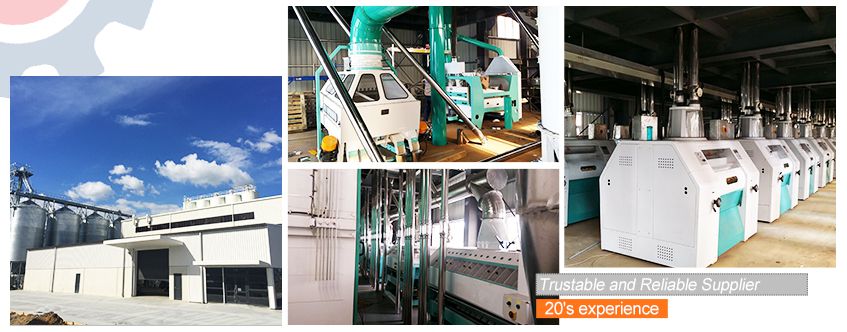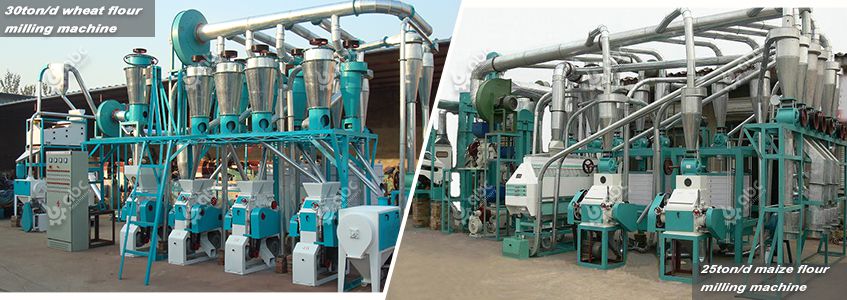The flour milling industry is a vivacious segment that combines conventional skills with high technology to manufacture an extensive range of flours. Similar to several other industries, the flour mill industry has sustained to consolidate in recent years. Flour production process is the practice by which rice, wheat, maize, corn, barley, etc., are ground into flour with the help of flour milling machine, through which the grain is separated into their constituent parts. (Related post: Wheat Flour Mill Plant Cost >>)

Different Flour from Various Grains
Products made from flour are indispensable foods in our daily lives. Therefore, the number and scale of global flour mills are developing rapidly, and the number of medium and large flour processing machinery is also increasing. In this context, how can investors seize market opportunities in the flour processing industry and start their own business plans for flour milling? This is a problem for investors. Therefore, ABC Machinery, a flour processing equipment manufacturer, will give investors a detailed explanation of the opportunity to establish a flour mill to help you successfully develop your flour milling companies in UK, Zambia, Thailand, India and other countries.
Flour mill business may look competitive, but due to increasing demand of flour, this business has many opportunities even for the beginners. Businesses in flour processing plant partake in activities, such as milling grains and vegetables into flour, cleaning, dusting and crushing rice and manufacturing malt from different cereal grains. Industry operators buy grains, like wheat, barley, corn/maize and rice directly from growers or wholesalers at very cheap price. Then, they process them into flour, malt, starch and gluten by adopting advanced flour processing machine and sell those flour products to grocery traders or other food-associated industries to earn profits. (Read more: Small Flour Mill for Home Use >>)

ome Products Processing From Flour
Flour is a precious, versatile and nourishing product, which is crammed with minerals and vitamins. It is probably one among the most vital food ingredients in the world and it forms a necessary part of the daily diet of people, ranging from breakfast to sandwich lunch or day tea, through to the evening meal. Some of the flour milling industry products includes:
Therefore, the use of flour machinery can produce more kinds of food and industrial products. Investors can choose flour milling equipment to process various types of flour products according to their own needs.
The capital investment required to perform flour milling functions is the major barricade to new entrants of flour milling industry. Flour milling is quite capital intensive that needs a huge up-front investment in buying flour mill machinery and setup complete flour mill plant. Another factor influencing the prospective new industry entrants is the level of production. Several existing companies are featured by large-scale manufacture volumes, which minimize per-unit manufacturing costs. Moreover, industrial flour mill plants are capable of buying input commodities, such as wheat, barley, corn, rice, etc., in bulk for a low-cost per-unit, thus accomplishing economies of scale. New flourmill industry entrants usually do not have the large-scale manufacturing facilities essential to make the most of lower commodity expenses. (Related project: 160TPD Wheat Flour Milling Project Built in New Zealand >>)

Industrial Flour Milling Plant
As flour mills supply goods that are measured in diet staples, the flour mill industry will stay pertinent in the years to come. Revenue and turnover will count on the price and production of rice, wheat, maize, corn, barley, etc. As businesses vertically incorporate and combine operations to make the most of the economies of scale, income will increase. (Read more: Industrial Flour Mill Machine Price >>)
In recent years, especially in the past one or two years, due to changes in the grain machinery industry pattern, qualitative changes have taken place in the design of complete sets of flour equipment from mechanical processing and manufacturing to flour milling process design. The overall quality of the whole set of flour equipment project is close to the single-piece equipment procurement, professional process design implemented by large flour processing enterprises, and the quality of the installation project is undertaken by itself; but the overall investment cost is much less than the single-piece procurement investment cost. Therefore, It is definitely profitable to invest in a complete set of flour milling equipment to build your own flour mill.
The complete wheat and maize flour milling line produced by ABC Machinery can meet the needs of investors for a variety of output in the flour mill business. As the source manufacturer of flour processing equipment, ABC Machinery can make equipment layout diagrams for flour mills, provide low-cost and high-quality flour milling machines, and also be responsible for the installation and commissioning of equipment, which can help investors to smoothly carry out flour mill processing business.

Start A Small Flour Milling Business
The Output and Project Cost of Complete Flour Milling Production Line
| Grains | Capacity | Project Cost |
|---|---|---|
| Wheat | 10~1000TPD |
Based on capacity and equipment selected,
and installation and commissioning requirements.
|
| Maize | 5~200TPD |
Analysis on global flour milling industry – factory price flour milling machinery for new business: buy industrial flour mill equipment from flour milling machinery manufacturer or supplier at factory price, get FREE technical instruction of flour milling process and business plan to set up flour mill project in Kyrgyzstan, Pakistan, Bangladesh, Uzbekistan, Saudi Arabia, etc., at low cost. If you have any questions or needs related to flour milling machines and projects, please click the button below to contact us, we will arrange professionals to communicate with you as soon as possible and provide you with suitable solutions.
Cereals and oils are bulk products of agricultural products and important commodities related to the national economy and people's livelihood. Countries all over the world attach great importance to the development of its processing technology and equipment. Flour deep processing products have a broad market in the grain and oil processing industry. During the rapid development of the flour mill processing industry, countries have continuously adopted new technologies and improved resource utilization, which has made the traditional wheat processing industry flourish. The following ABC Machinery mainly introduces the development status of flour mill equipment in the United Kingdom, the United States, China and Africa, for reference by the majority of flour business.

Setup a Flour Mill Plant in Africa
United Kingdom
The United Kingdom is self-adequate in flour with a small constructive trade balance. In the UK, the flour is used as the major ingredient in bread, but it can also be used to make cakes, biscuits, soups, pies and a variety of processed foods. Nowadays, flour milling in the United Kingdom is an automatic and resourceful industry, having developed a long-way from the days of wind-driven and water-driven mills. Modern flour mills function as incessant-flow operations all through the year. The flour milling industry in the United Kingdom continues to be the major single user of domestic wheat.
United States
The size and number of flour mill machine in the American flour milling industry cause the structural changes in the country. This is because of the increasing disposable income and declining in grain prices. As these are the major reasons for changes in the distribution and size of bigger flour mills, automation in manufacture and higher disposable proceeds are vital factors for smaller mills. It is also expected that the domestic supply of flour will be adequate to meet the rising domestic demand by 2000, although the number of wheat flourmills in the United States is expected to decline to 160 from the existing 203. (Read more: Automatic Flour Mill Plant Setup >>)
China
Regarding flour supply, the flour milling industry in China grinds more flour, particularly wheat flour, than any other country in the world. During communist times, many small mills served an area, which is equal to the size of a township. The smallest political division of China takes in local wheat to manufacture flour for nearby villages and towns. However, the condition has been changing quickly in the 30 years since the start of the market-oriented economic improvements. There has been a stable trend toward bigger mills, which are mainly selling to food processing businesses, targeting the growing urban population in the country.
Africa
Africa has great potential for developing flour milling industry because of its large population and rich grain resources. There have been many flour milling plant built in Sthiopia, Ghana, Uganda, Kenya, Zambia, etc. But in fact the market potential is still large, which means it is still profitable to set up wheat flour mill plant or maize flour milling facotry in the above countries or many other African countries. (Latest project: 20TPD Maize Milling Plant Project in Mozambique >>)
After analyzing the development opportunities and investment benefits of flour mill processing industry and flour mill processing plant by ABC Machinery, it can be understood that investment in flour mill processing plant is very promising and has profit margins. If you want to join the flour mill processing business, open a flour mill processing plant, or need to purchase the flour milling machine or production lines, you can fill in the message form below to contact ABC Machinery for a turnkey solution.